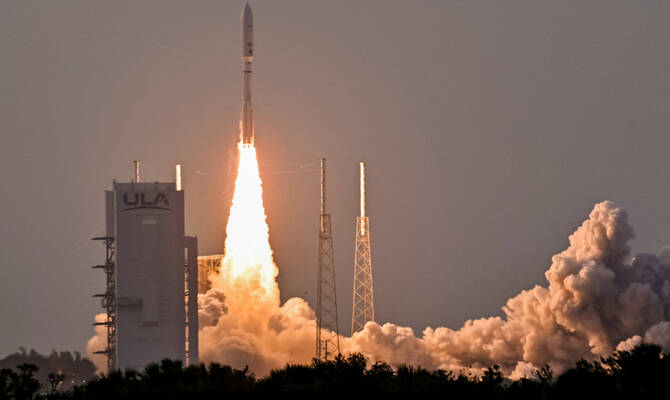Amazon’s ambitious Project Kuiper took a major step forward on Monday as the company successfully launched its first operational batch of Internet satellites into orbit, joining the competitive race to provide global broadband coverage. A United Launch Alliance Atlas V rocket carried 27 Kuiper satellites into space from Cape Canaveral Space Force Station, following a weather delay earlier this month.
The satellites, named after the Kuiper Belt beyond Neptune, are designed to eventually operate at an altitude of nearly 400 miles (630 kilometers). Amazon previously launched two test satellites in 2023 and has since made major upgrades to its hardware. Among the improvements, the new satellites are coated with a special mirror film intended to scatter reflected sunlight and reduce interference with astronomical observations—a growing concern among scientists as satellite constellations expand.
Founded by Jeff Bezos, Amazon plans to deploy over 3,200 satellites as part of Project Kuiper to deliver fast, affordable internet access worldwide. SpaceX, led by Elon Musk, currently dominates the market with more than 7,000 Starlink satellites active in orbit. Meanwhile, Europe-based OneWeb maintains a smaller constellation of satellites at higher altitudes.
Amazon has already secured dozens of future launches with United Launch Alliance, its own Blue Origin venture, and other providers to complete the Kuiper network. "There are some things you can only learn in flight," said Rajeev Badyal, Project Kuiper’s vice president, acknowledging that Monday’s launch is only the beginning of Amazon’s efforts in space. "No matter how the mission unfolds, this is just the start of our journey."
Monday’s successful launch follows an earlier setback due to poor weather but marks a crucial milestone as Amazon works to build a constellation that could challenge SpaceX’s Starlink dominance in the booming satellite internet industry.
The satellites, named after the Kuiper Belt beyond Neptune, are designed to eventually operate at an altitude of nearly 400 miles (630 kilometers). Amazon previously launched two test satellites in 2023 and has since made major upgrades to its hardware. Among the improvements, the new satellites are coated with a special mirror film intended to scatter reflected sunlight and reduce interference with astronomical observations—a growing concern among scientists as satellite constellations expand.
Founded by Jeff Bezos, Amazon plans to deploy over 3,200 satellites as part of Project Kuiper to deliver fast, affordable internet access worldwide. SpaceX, led by Elon Musk, currently dominates the market with more than 7,000 Starlink satellites active in orbit. Meanwhile, Europe-based OneWeb maintains a smaller constellation of satellites at higher altitudes.
Amazon has already secured dozens of future launches with United Launch Alliance, its own Blue Origin venture, and other providers to complete the Kuiper network. "There are some things you can only learn in flight," said Rajeev Badyal, Project Kuiper’s vice president, acknowledging that Monday’s launch is only the beginning of Amazon’s efforts in space. "No matter how the mission unfolds, this is just the start of our journey."
Monday’s successful launch follows an earlier setback due to poor weather but marks a crucial milestone as Amazon works to build a constellation that could challenge SpaceX’s Starlink dominance in the booming satellite internet industry.


















